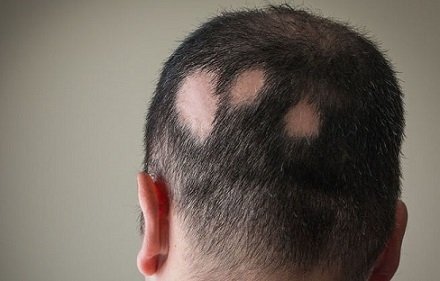Yale Scientists Find That JAK Inhibitors Such As Tofacitinib, Ruxolitinib, Baricitinib And Ritlecitinib Can Be Used To Treat Alopecia Areata Hair Loss!
Thailand Medical News Team Aug 19, 2023 1 year, 8 months, 1 day, 11 hours, 12 minutes ago
Hair Loss Treatments: Alopecia areata, a distressing autoimmune disorder that causes hair loss, has long proven to be a challenging condition to treat. However, recent groundbreaking research conducted by Yale University scientists has unveiled a potential game-changer in the field of dermatology. Janus kinase (JAK) inhibitors, once predominantly used in other medical contexts, have emerged as a remarkable solution for treating moderate to severe alopecia areata. Dr Brett King and Dr Brittany Craiglow from Yale University-USA led a pivotal study, shedding light on the efficacy of JAK inhibitors in managing this debilitating condition.
 Understanding Alopecia Areata
Understanding Alopecia Areata
Alopecia areata is an autoimmune disease that leads to the sudden and often unpredictable loss of hair, primarily manifesting as round patches of baldness. While it can occur at any age, it is more commonly observed in children. In severe cases, this condition can escalate to complete hair loss across the entire body. Its causes are multifaceted, with genetic factors and immune system dysregulation playing prominent roles. Additionally, individuals with certain medical conditions and those treated with specific drugs, like nivolumab, are more susceptible to alopecia areata.
Interesting it should be noted that with the advent of the COVID-19 pandemic, it has been reported that the incidence of alopecia areata in many Post COVID individuals is increasing and there it is now also a common manifestation seen in Long COVID. Some cases have also materialized as a result of the COVID-19 vaccines.
https://pubmed.ncbi.nlm.nih.gov/35165610/
https://www.jaadinternational.org/article/S2666-3287(22)00017-7/fulltext
https://academic.oup.com/asj/article/42/11/NP699/6611905
https://www.sciencedirect.com/science/article/pii/S2352512622002041
https://onlinelibrary.wiley.com/doi/full/10.1111/jocd.15618
JAK Inhibitors: A New Hope
Historically, managing moderate to severe alopecia areata has been a challenging endeavor, often leaving patients with limited treatment options. However, the groundbreaking discovery of the potential efficacy of JAK inhibitors has ushered in a new era in dermatology. JAK inhibitors target the inflammatory pathways that contribute to alopecia areata, effectively curbing the autoimmune response responsible for hair loss. Dr Sandra Johnson, a dermatologist at the University of Arkansas for Medical Sciences, explains that these inhibitors bring the immune system back into balance by reducing the underlying inflammation.
The Yale Study: A Turning Point
Dr Brett King and Dr Brittany Craiglow from Yale University embarked on a study that would transform the landscape of alopecia areata treatment. Their f
indings, published in the Journal of the American Academy of Dermatology, established JAK inhibitors as a promising solution. By directly addressing the immune system's role in hair loss, JAK inhibitors offer hope to individuals suffering from this condition. The study's impact has been immense, generating excitement among dermatologists and patients alike.
Real-Life Success Stories
Courtney Martens, a resident of Edmond, Okla., is a living testament to the remarkable potential of JAK inhibitors. Diagnosed with alopecia areata in 2017, Martens experienced devastating hair loss that significantly impacted her self-esteem and identity. However, after undergoing JAK inhibitor treatment, Martens achieved a remarkable transformation. Her hair regrowth journey serves as a beacon of hope for countless others facing similar challenges.
A New Era in Hair Loss Treatments
JAK inhibitors have effectively shattered the limitations of traditional alopecia areata treatments. Notably, two JAK inhibitor drugs, baricitinib and ritlecitinib, have received approval, while deuruxolitinib is on the brink of gaining regulatory clearance. The approval of these drugs and ongoing clinical trials highlight the promising strides being made in the field.
Choosing the Right Treatment
While JAK inhibitors offer immense potential, it's important to acknowledge that no single treatment is universally effective for everyone. Dermatologists play a critical role in tailoring treatment plans to individual patient needs. Moreover, other treatment options, including contact immunotherapy, disease-modifying antirheumatic medications, and anti-inflammatory corticosteroids, also remain valuable tools in the fight against alopecia areata.
The Future of Alopecia Areata Treatment
The discovery of JAK inhibitors' potential in treating alopecia areata represents a pivotal moment in medical research. With more treatment options available than ever before, patients who previously struggled to find relief are now seeing tangible improvements in their condition. As the field of dermatology continues to evolve, it is anticipated that even more innovative therapies and treatment modalities will emerge, further improving the lives of individuals impacted by alopecia areata. With scientific breakthroughs like this, there is newfound hope for those living with the challenges of autoimmune hair loss, reminding us that every strand of hair holds a story of resilience and transformation.
The study findings can be found here:
https://www.jaad.org/article/S0190-9622(23)00988-X/fulltext
For more about
Hair Loss Treaments, keep on logging to Thailand Medical News.
